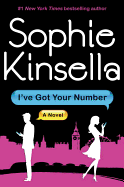
| Publisher: | Dial Press | |
| Genre: | Humorous, Fiction, Romance, Contemporary Women, Contemporary | |
| ISBN: | 9780385342063 | |
| Pub Date: | February 2012 | |
| Price: | $26 |
| Fiction |
by Sophie Kinsella
Sophie Kinsella, author of the Shopaholic series, has written another fun, frothy tale starring a heroine with a predictably complicated love life. As I've Got Your Number opens, Poppy Wyatt, happily engaged to the very attractive Magnus, loses an expensive heirloom emerald ring. Then, to make matters worse, her cell phone gets stolen. Panicked, Poppy seizes a phone lying in a nearby trash bin and gives the number to everyone in the vicinity, telling them to call if they find her ring.
Handsome high-powered businessman Sam Roxton shows up, demanding the phone, which belonged to his former assistant. Poppy makes Sam a deal: if he'll let her use it while she waits for a call about her emerald, she'll forward all his business e-mails and texts.
Sam and Poppy find themselves in a delicate situation; sharing a phone is surprisingly intimate. Suddenly they know a lot about each other's careers, friends and love lives. As Poppy plans her wedding and tries to solve the ring dilemma, Sam attempts to pull off a huge business deal and protect the reputation of his mentor. Can they pull it off with only one phone?
Told in the first person by Poppy, with copious footnotes inspired by Magnus's academic writing, I've Got Your Number is a lighthearted look at getting to know a stranger. Poppy's antics will keep you laughing and make you wonder how much of your own life is in your phone. --Jessica Howard, blogger at Quirky Bookworm

| Publisher: | St. Martin's Press | |
| Genre: | Fiction, Cultural Heritage, Contemporary Women | |
| ISBN: | 9780312658519 | |
| Pub Date: | February 2012 | |
| Price: | $25.99 |
| Fiction |
by Eleni N. Gage
Eleni N. Gage was raised in Greece and the United States; she knows something of the push and pull that different cultures exert on a young woman. Her fascination with cultural rituals and traditions led to a degree in folklore and mythology at Harvard, then an MFA in Creative Writing from Columbia, followed by a memoir (North of Ithaka) about living in the small Greek village where her father was born. Now, in her first novel, Other Waters, Gage continues her exploration of divergent cultures and their influence on character development.
At the start of Other Waters, Maya seems to have everything a young woman could want: a blossoming career as a psychiatry resident, a loving boyfriend and a close-knit family (the members of which are all as accomplished as she). When her beloved grandmother dies in India, however, a disagreement with a family servant triggers a cascade of worrisome events for Maya and the other members of her family. Believing her family to be cursed, Maya travels back to India with her best friend to investigate the troubles and to attend a family wedding. It is during this trip that she is able to recognize the limitations of her relationship with her boyfriend, the strengths of her family ties and the importance of her cultural heritage.
Gage has written an appealing story, and she moves between cultures easily; perfectly placed details allow readers to feel comfortable as characters travel between work, home and family (both along the East Coast and in India). Appreciative readers will enjoy Other Waters, and may find themselves looking forward to Gage's future works as well. --Roni K. Devlin, owner of Literary Life Bookstore & More
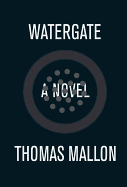
| Publisher: | Pantheon | |
| Genre: | General, Political, Fiction, Historical | |
| ISBN: | 9780307378729 | |
| Pub Date: | February 2012 | |
| Price: | $26.95 |
| Fiction |
by Thomas Mallon
The scoundrels and victims at the heart of America's worst political scandal come to life in Thomas Mallon's (Dewey Defeats Truman) imaginative re-creation of Watergate, from the bungled break-in at the Democratic National Committee headquarters in the building that gave the scandal its name, through the battle over the Oval Office tapes to Richard Nixon's resignation two years later. Mallon unravels the tangled threads of this well-known chronology, employing multiple points of view--from Howard Hunt and Rose Mary Woods all the way up to Richard Nixon, his characteristic mix of combative self-pity on display--to show how swiftly an administration at the height of its power morphed into a criminal enterprise.
At the center of this account of the legal and ethical meltdown is Fred LaRue, a Mississippi businessman and aide to Attorney General John Mitchell who became ensnared in the effort to silence Hunt and the other burglars through generous hush money payments. LaRue's effort to suppress the truth of his mentor's complicity in the coverup mirrors his own fear that a long-buried personal secret may be exposed.
The novel offers intriguing theories to explain some prominent aspects of the story: the motivation for the break-in; the 18 ½-minute gap in the tape of the meeting where Nixon discussed the burglary for the first time; and his insertion of a jarringly inapt quotation from Theodore Roosevelt in the maudlin farewell speech to his staff on the morning after his resignation. But where a lesser writer might indulge in pure sensationalism, Mallon hews closely to the historical record, all the while attentively conjuring the interior lives of these real-life characters. --Harvey Freedenberg

| Publisher: | Dark Coast | |
| Genre: | Fiction, Literary | |
| ISBN: | 9780984428854 | |
| Pub Date: | February 2012 | |
| Price: | $16.95 |
| Starred | Fiction |
by Kris Saknussemm
When science fiction novelist Kris Saknussemm (Zanesville) brings his cockeyed humor to the center of the Bible Belt, the result, Reverend America, is a picaresque tale of a prodigy albino orphan criss-crossing the country to heal a big tent of weird but heart-warming losers. Mix the best of Tim Dorsey and Hunter Thompson with Flannery O'Connor, and you'll get the picture.
Mathias "Casper" True is raised in Joplin by a two-bit con-artist couple, Poppy and Rose, who turn his gifted voice into an evangelical gold mine. "They knew a good thing when they heard it," Saknussemm writes. "He was rechristened Reverend America, a child-preaching sensation of the White Angel Fire & Faith Revival mission... an albino child in a coat of many colors [who] yells and sings like a mutant angel... so the club footed jig, the stooped straighten... and the white fire sweeps through the room setting every soul alight." In time, the greedy Poppy and Rose get out-conned by an even bolder swindler promising a lifetime stream of profits from a squirrel burger fast-food franchise.
Casper, orphaned and destitute again, bums back through the same godforsaken towns of his Reverend America heyday, picking up strangers in need: a pregnant prostitute here, an abandoned octogenarian folksinger there. Along the way he finds that, even though he could still "beat the Hell and Heavenly light out of Revelation," his compassion for the downtrodden is his ultimate gift. He's a Rinder, as Saknussemm puts it, "a piece of pork rind to repair an axle bearing or ruptured radiator. [It] wouldn't solve all your troubles, but it would get you to the next town." The best road trip is an enlightening, redemptive one--and Reverend America gives us a damn good one. --Bruce Jacobs, founding partner, Watermark Books & Cafe, Wichita, Kan.

| Publisher: | Harper Perennial | |
| Genre: | General, Fiction | |
| ISBN: | 9780062004369 | |
| Pub Date: | February 2012 | |
| Price: | $14.99 |
| Fiction |
by David Foenkinos
Natalie's perfect life is shattered by the unexpected death of her beloved husband. The still young, beautiful widow seems to take the advice of Sting and builds a fortress around her heart. She dives into work, creating a sterile existence where she numbly goes through the motions of living life. At first, it's uttery wrenching to witness, but French novelist David Foenkinos isn't one to hang crepe, and in Delicacy he has created a novel that's a cheery, addictive confection of zany footnotes and asides.
Foenkinos takes the tale on an upswing by introducing Natalie's coworker, Marcus, a seemingly unsuitable suitor who nearly by accident attempts to melt her frozen heart. Many laugh-out-loud moments ensue when the rest of the office doesn't believe that Natalie would ever be interested in such a plain specimen of a man. In addition to the will-she-or-won't-she plot, Foenkinos includes several half-page chapters that provide commentary on action that just took place, from a Wikipedia definition of Pez candy or the football scores of the matches playing the night Natalie rejects a potential lover to a menu of what Natalie and Marcus ate during their first dinner out. These supplements are a stroke of brilliance, providing a fly-on-the wall perspective on this offbeat story of loss, love and unexpected twists of fate. --Natalie Papailiou, blogger at MILF: Mother I'd Like to Friend
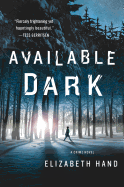
| Publisher: | Minotaur | |
| Genre: | Fiction, Thrillers | |
| ISBN: | 9780312585945 | |
| Pub Date: | February 2012 | |
| Price: | $23.99 |
| Mystery & Thriller |
by Elizabeth Hand
Cassandra Neary lives hard. Between the drugs, the booze and her trauma-ridden past, she just barely stays afloat; a recent foray (in 2007's Generation Loss) back into her former field of photography didn't earn her much, other than a suspicion of murder that she's eager to outrun. So when a mystery man contacts her from overseas, offering a chance to put her 30-year-dead photography skills back into action for a tidy sum, she leaves her New York City slum life without too much consideration. Correspondence from her high school boyfriend Quinn--long thought dead--pushes her along, too.
But Cass is greeted in Helsinki not only by gruesome photographs--more or less her specialty--but by gruesome murders as well, and she has to keep moving. So it's on to Reykjavik in the heart of winter, where Cass makes her way through a world of icy cold, hard drugs, black metal, mental illness and multiple murders. A reunion with Quinn lends adrenaline and excitement, but no greater light.
Not for the weak-stomached or the easily frightened, Available Dark is a masterpiece of lovely writing and ghastly details. Elizabeth Hand, who has a personal background in the early New York punk scene, treats the finer points of Scandinavian black metal with respect. Her writing is sharp-edged and gritty, and fully realized, filled with frightening, contradictory characters and shocking edge-of-the-seat twists. Cass's artistic perspective, as she photographs ritual killings and crime scenes, adds another layer to what might have been a straightforward thriller. Great fun, if you can hang on for the ride! --Julia Jenkins, librarian and blogger at pages of julia
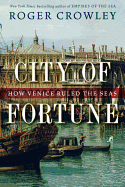
| Publisher: | Random House | |
| Genre: | History, Renaissance, Europe, Italy | |
| ISBN: | 9781400068203 | |
| Pub Date: | February 2012 | |
| Price: | $32 |
| History |
by Roger Crowley
Roger Crowley (Empires of the Sea) returns to the medieval and early modern Mediterranean in City of Fortune, using three defining moments to tell the story of Venice's development from a "smattering of low-lying muddy islets set in a malarial lagoon" to the greatest power in the region: the city-state's pivotal role in the Fourth Crusade and the sacking of Constantinople in 1204; the city's bloody rivalry with Genoa for control of the East-West trade; and its desperate defense against the Ottoman Empire's expansion into the Mediterranean in the 15th century.
As in his earlier books, Crowley's fast-paced narrative style and vivid character sketches strike a nice balance between the big picture and the important detail. He tells the story using a variety of voices. In addition to accounts by Venetian doges, merchants and city officials, he uses those written by--often hostile--outsiders, including the poet Petrarch, Pope Innocent III, Norman crusaders and Cretan rebels. Trade is the theme that ties all these stories together. With no natural resources, no agriculture and a small population, Venice depended entirely on trade for its survival. Its relationships first with Byzantium and later with the Islamic world were both the foundation of its prosperity and a source of contention with the rest of Christendom. Control of the western end of the overland trade caravans was the key to Venice's success as "Europe's first full-blown colonial adventure." Crowley ends with the event that would bring Venetian maritime dominance to a close: the news that Portugal had found a sea route to India, rendering the Venetian empire suddenly obsolete. --Pamela Toler, blogging at History in the Margins
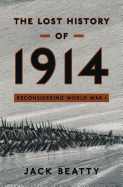
| Publisher: | Walker & Co. | |
| Genre: | General, History, World, Military, World War I | |
| ISBN: | 9780802778116 | |
| Pub Date: | February 2012 | |
| Price: | $30 |
| History |
by Jack Beatty
In The Lost History of 1914, NPR's Jack Beatty takes on what he describes as the "cult of inevitability" that surrounds historical accounts of the First World War. Most books about the war's origins focus on the events leading up to the assassination of Archduke Franz Ferdinand at Sarajevo in June, 1914, and the subsequent domino effect of alliances that pulled Europe into war.
Beatty, by contrast, considers a handful of events that dominated international headlines in the months before the war: a threatened coup in the German Reichstag over military actions in Alsace; a change in Russian foreign policy based on Tsar Nicholas's fears of seeming weak; a potential civil war in Ireland over Home Rule; Woodrow Wilson's support of Pancho Villa and the Mexican Revolution; and the defeat of a leftist minister in France because his wife murdered a right-wing newspaper editor. At the end of each chapter, Beatty offers a counterfactual account of events that would have changed Europe's response to the events at Sarajevo.
None of these events is unknown to historians, though they may be less familiar to the nonspecialist reader. The originality of Beatty's work lies in bringing them together as threads in a single narrative. Looked at individually, each story is a compelling slice of history, told in a conversational style. Taken as a whole, The Lost History of 1914 makes a powerful argument that the chain of events leading to the First World War was not just complicated, but fragile--so fragile, perhaps, that the inevitable war might better be described as the unlikely war. --Pamela Toler, blogging at History in the Margins
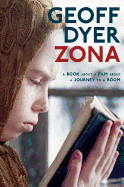
| Publisher: | Pantheon | |
| Genre: | Performing Arts, Biography & Autobiography, Film & Video, History & Criticism, Personal Memoirs | |
| ISBN: | 9780307377388 | |
| Pub Date: | February 2012 | |
| Price: | $24 |
| Essays & Criticism |
by Geoff Dyer
Does Geoff Dyer really know everything? In addition to his exceptional novels, his nonfiction subjects include John Berger, D.H. Lawrence, yoga, jazz and photography, and now Zona sets him off on another diverting journey--to describe, explain and appreciate Andrei Tarkovsky's 1979 film Stalker. It really doesn't matter if you have never seen this much-studied masterpiece, because Dyer walks us frame by frame through the film's opening black-and-white metaphorical journey until it transitions into color as the Stalker guides us into the magical "zone." (Sound familiar? In a footnote, Dyer observes that "similarities between Stalker and The Wizard of Oz have been widely remarked on... or so I'm told. I've never seen [it]... and obviously have no intention of making good that lack now.")
The pleasures of reading Dyer are found in personal asides that connect his ostensible subject to a myriad of tangential subjects. In one five-page span, he mentions Burning Man, T.S. Eliot, Walker Evans, Heidegger, Richard Widmark and Lars von Trier. (Discussing the latter's film Antichrist, Dyer is ruthless: "[It] is daft in the way all horror films are daft... it's nonsense, a highly crafted diminution of the possibilities of cinema.") When he notes that Stalker's last scene "redeems, makes up for, every bit of gore, every wasted special effect, all the stupidity in every film made before or since," we can't help but search out the desolate Russian film to see it for ourselves... Dyer is that good. --Bruce Jacobs, founding partner, Watermark Books & Cafe, Wichita, Kan.

| Publisher: | Graywolf Press | |
| Genre: | General, American, Poetry | |
| ISBN: | 9781555976057 | |
| Pub Date: | February 2012 | |
| Price: | $22 |
| Poetry |
by D.A. Powell
D.A. Powell is in fine form in his fifth book of poems. After winning the Kingsley Tufts Poetry Award for 2009's Chronic, this collection spreads his talents so broadly that its poems are arranged in two parts: the somewhat grim melancholy of Useless Landscape and the more playful, edgy eroticism of A Guide for Boys. Combining his pleasure in puns and slang with more traditional language and structure (even sestinas and sonnets), Powell drifts over a landscape of central Californian flora, gay sex, 1970s funk, the physiology of aging, insect control and even high school marching bands.
Powell finds himself writing as an older man, "Winded, white-haired body. Splotchy skin./ A face uneven as a river jag/ and asperous as the mullein's flannel leaves." He reminisces about a promiscuous sexual encounter: "That's the way we talked./ We lived in an age of adolescence and irony./ Unless I'm thinking of another dude. That happens a lot." And the past sadly reminds him that "sorry is the heart/ that knows/ what's around the bend."
However, the poem "A Little Less Kettledrum, Please" perhaps best captures Powell's more prevalent tone of fun and optimism. Adrift in his school's clumsy marching band, he keeps a wary eye: "We do a scramble pattern then./ That's when I imagine I am to be struck/ by the first trombone." As they finally leave the field, Powell proudly notes that "I may be the least of the piccolos,/ But mine's the tune you'll whistle as you leave." This new collection may not leave you whistling, but it should leave you smiling. --Bruce Jacobs, founding partner, Watermark Books & Cafe, Wichita, Kan.
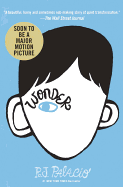
| Publisher: | Knopf | |
| Genre: | Daily Activities, Self-Esteem & Self-Reliance, Social Issues, Health & Daily Living, Juvenile Fiction, Special Needs | |
| ISBN: | 9780375869020 | |
| Pub Date: | February 2012 | |
| Price: | $15.99 |
| Children's & Young Adult |
by R.J. Palacio
This extraordinary book will make you see the world differently.
R.J. Palacio's debut novel, told through six different first-person narratives, forms a composite of what life is like for and because of 10-year-old August Pullman. When he was a baby, the doctors didn't think August would live. A rare genetic perfect storm "made war on his face," as August's sister, Via, puts it. Via loves her brother, but she's also a realist. So is August, as he makes plain on the first page: "I won't describe what I look like. Whatever you're thinking, it's probably worse." Their bond forms the foundation of this inspiring story.
The book follows the academic year: August begins school for the first time as a fifth grader at Beecher Prep, while Via starts at the prestigious Faulkner High School. In addition to August and Via, we hear from two peers of each of the siblings. We watch the changing dynamics as August leaves the protection of home, as Via sees an opportunity to shed her identity as August's sister, and as both of them experience friends who betray them, and win perceived enemies to their side.
Things are not always as they appear, as August will be the first to tell you. His presence in people's lives acts as a catalyst to bring them face to face with themselves. And if they look deep enough, they find humor, courage and friendship. May this be the first of many books to come from R.J. Palacio. --Jennifer M. Brown, children's editor, Shelf Awareness
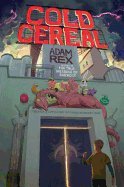
| Publisher: | Balzer & Bray/HarperCollins | |
| Genre: | Fantasy & Magic, Legends, Myths, & Fables, Juvenile Fiction, Humorous Stories, Arthurian | |
| ISBN: | 9780062060020 | |
| Pub Date: | February 2012 | |
| Price: | $16.99 |
| Children's & Young Adult |
by Adam Rex
In a marketplace of books overrun by escapees from paranormal lands, here's one featuring a leprechaun, a rabbit-man and Bigfoot that's a breath of fresh air. Cold Cereal, the first in a planned trilogy, is full of magic and just as smart and funny as we have come to expect from Adam Rex (The True Meaning of Smekday).
A rabbit-man meets up with sixth-grader Scott, just after Scott's mother has moved him and his younger sister, Polly, to Goodborough, N.J., to work for the Goodco Cereal Company. Scott has been seeing strange creatures his whole life, but this is the first time that one has asked Scott to hide him. In the meantime, at school, Scott makes friends with twins Erno and Emily, who are in their own way just as strange as his discovery of a leprechaun in his bed.
Much like its premise--a cereal company being run by evil villains--the story gets sillier and also more serious. Rex uses Mysterious Benedict Society–esque puzzles, and storyboards that poke fun at advertising to complement the fast-moving story. Kids will appreciate his dry sense of humor and the undercurrent of danger. Though the book's a bit on the long side, most readers will find themselves drawn in by at least one of the storylines, and Rex's stellar pacing takes over from there. Before you know it, readers might be asking for toast instead of Lucky Charms, just in case the tale has some basis in reality. --Stephanie Anderson (aka Bookavore), manager of WORD bookstore